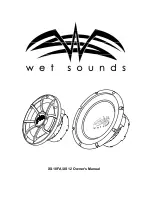
SPEAKER PLACEMENT:
The M-20 Monitor System is intended to provide consistent performance over a wide range of placement
situations. This is accomplished through the use of electrical controls, wide dispersion drivers,
advanced enclosure design and carefully chosen crossover characteristics. Nevertheless, it is always
worth investing time and effort experimenting with optimum loudspeaker placement. In all cases, the
M-20 Monitors should be set up the same distance from the listening position. (see fig. 8 below) This is
important in order to insure equal arrival time of all channels to the listening position. Ideally, the
tweeter height on the M-20 monitor, as with all channels, should be on axis with your ears, or slightly
above. Also, remember that nearby reflective surfaces (including video monitors) can alter impulse
response, blur imaging and change tonality; giving the M-20 as much room as possible assures the
highest-quality reproduction.
SYSTEM OPERATION:
The M-20 is capable of very high output levels, especially when listening in the near-field. Still, every
speaker system has its limits. Harsh breakup at extremely high volume, or heat emanating from the drivers
is an indication that the system has exceeded its output limits and that you should lower the playback level.
Watch for excessive lighting of the front-panel overload indicator on the Control Amplifier. Speaker
damage most often occurs from sustained high volume levels, not from transient sounds or brief musical
peaks. Protect your ears and use common sense.
M-20 MONITOR SYSTEM CARE:
Except for the occasional flattering comment, your M-20 System needs no regular maintenance. Never
attempt to clean the M-20 Monitor driver units except for very light feather dusting. The M-20 Monitor
cabinets and the M-20 Control Amplifier front panel can be cleaned using a damp, soft cotton cloth first
sprayed with a mild, non-abrasive glass cleaner and with the unit unplugged and AC power off. Never spray
the speaker or amplifier directly! Avoid silicone and oil based cleaners or treatments.
NEED SOME HELP?
Technical Support can be reached several ways: Telephone us 800-NHT-9993 (648-9993, E-mail us at:
[email protected], Fax us at: (707) 747-1252 or write us at: NHT, 6400 Goodyear Rd. Benicia, CA 94510. Or visit
our web site at www.nhtpro.com.
Fig. 8 Ideal 5.1 Surround Monitor Placement
M-20
-2
M
0
M
0
-2
M-
20
-2
M
0
A
B
C
D
E
The Distance of
A=B=C=D=E


























